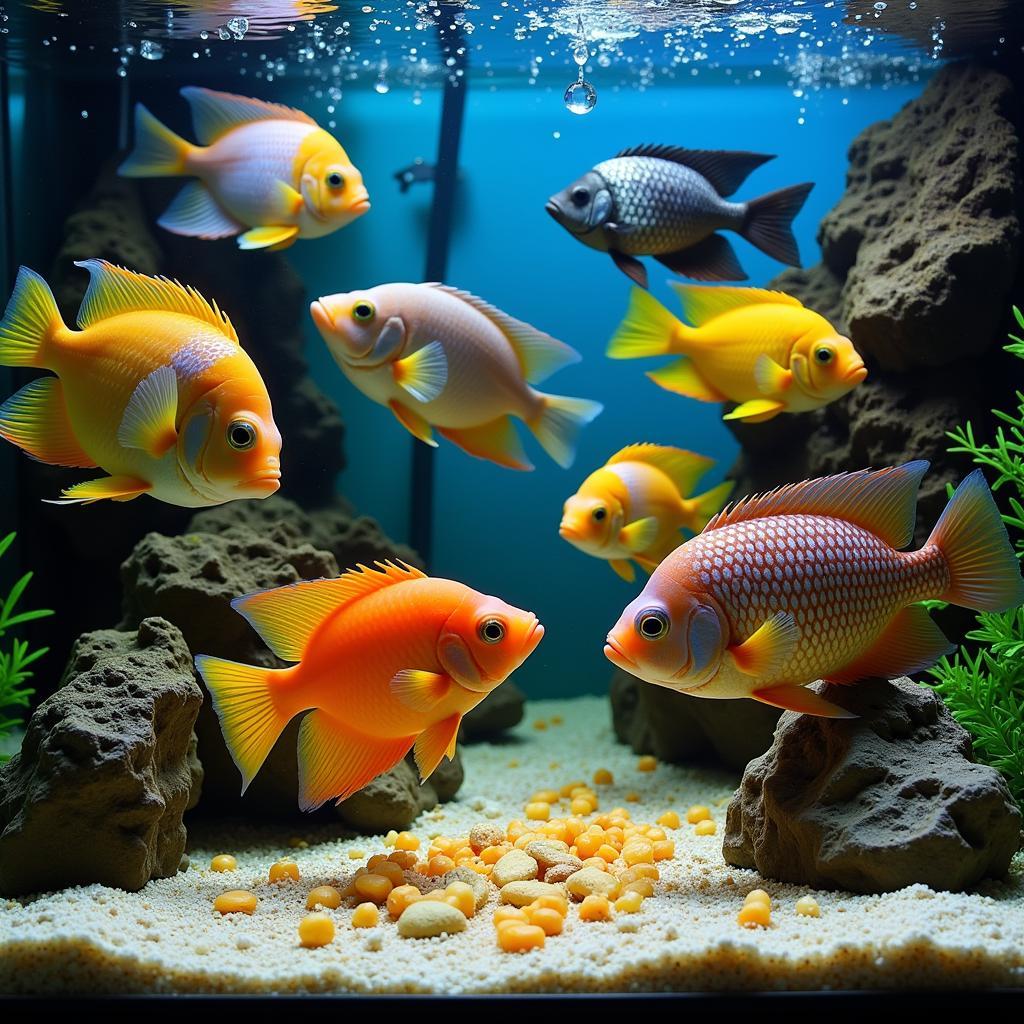Frozen Tropical Fish Food offers a convenient and nutritious way to supplement your aquatic friends’ diet. With a vast selection available, it’s essential to understand the benefits and factors to consider when choosing the best frozen food for your tropical fish.
Why Choose Frozen Tropical Fish Food?
Compared to tropical fish food flakes, frozen options offer several advantages. Freezing helps preserve the nutritional value of the ingredients, ensuring your fish receive optimal vitamins and minerals. Frozen foods often retain a more natural texture, appealing to picky eaters and replicating a more natural feeding experience.
Types of Frozen Tropical Fish Food
A trip down the fish food aisle reveals a variety of frozen options, each with unique benefits:
- Brine Shrimp: Rich in protein and easily digestible, brine shrimp are suitable for most tropical fish.
- Bloodworms: Packed with protein and iron, bloodworms are a great treat or supplement for carnivorous and omnivorous species.
- Mysis Shrimp: These small crustaceans are a natural food source for many fish and offer a good balance of protein and fat.
- Krill: High in protein and omega-3 fatty acids, krill promotes overall health and vibrant coloration.
- Plankton: A nutritious option for smaller fish and filter feeders, providing essential nutrients.
 Feeding Frozen Fish Food to Tropical Fish
Feeding Frozen Fish Food to Tropical Fish
Selecting the Right Food
When choosing frozen tropical fish food, consider your fish’s specific dietary needs:
- Species: Research the natural diet of your fish to determine the most appropriate food options.
- Size and Age: Smaller fish require smaller food items, while juveniles benefit from more frequent feedings with protein-rich options.
- Health Conditions: If your fish have specific health concerns, consult a veterinarian for dietary recommendations.
Tips for Feeding Frozen Fish Food
- Thawing: Always thaw frozen food completely before feeding to prevent digestive issues.
- Rinsing: Rinse thawed food under running water to remove excess juices and potential contaminants.
- Portion Control: Offer small amounts of food that your fish can consume within a few minutes to avoid overfeeding and water quality issues.
How to Store Frozen Fish Food
Proper storage ensures freshness and prevents spoilage. Store unopened packages in the freezer according to package instructions. Once opened, transfer the remaining food to an airtight container and use within a week for optimal quality.
Expert Insight: “Feeding a varied diet is crucial for the health and vitality of tropical fish,” says Dr. Emily Carter, a renowned aquatic veterinarian. “Frozen foods offer a convenient way to provide essential nutrients and replicate a more natural feeding experience.”
FAQs about Frozen Tropical Fish Food
How often should I feed frozen food to my tropical fish?
While frozen food can be offered daily, it’s best to provide a variety of foods throughout the week. Supplement frozen options with high-quality flakes, pellets, or live foods for a balanced diet.
Can I feed frozen food to my betta fish?
Yes, bettas can benefit from frozen foods like bloodworms and brine shrimp as part of a varied diet.
What are the signs of spoiled frozen fish food?
Discard frozen food with a foul odor, discoloration, or freezer burn.
Seeking More Fish Food Advice?
Dive into more helpful tips and explore our selection of high-quality fish food options:
For personalized recommendations or any questions regarding your tropical fish’s diet, please don’t hesitate to contact our expert team. We’re here to help your aquatic companions thrive. You can reach us at Phone Number: 02437655121, Email: [email protected] Or visit our store at: 3PGH+8R9, ĐT70A, thôn Trung, Bắc Từ Liêm, Hà Nội, Việt Nam. Our customer support is available 24/7.